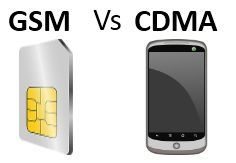 In this article, we are going to discuss the two popular technologies that provide multiple accessibilities to a channel GSM and CDMA. The basic difference between GSM and CDMA is that GSM is specific to a SIM card that is used with the mobile phone.
In this article, we are going to discuss the two popular technologies that provide multiple accessibilities to a channel GSM and CDMA. The basic difference between GSM and CDMA is that GSM is specific to a SIM card that is used with the mobile phone.
On the other hands, the CDMA is handset specific. Let us discuss some more differences between GSM and CDMA in the comparison chart shown below.
Content: GSM Vs CDMA
Comparison Chart
| Basis for Comparison | GSM | CDMA |
|---|---|---|
| Basic | GSM is SIM specific. | CDMA is Handset specific. |
| Full Form | Global System for Mobile communication. | Code Division Multiple Acess. |
| Technology | FDMA and TDMA | CDMA |
| Network | Network Tower in each cell serves the mobile phone of that area. | There are a physical channel and a dedicated code for each device in the network. |
| Transmission | Voice and data transmission at the same time. | Can not do voice and data transmission simultaneously. |
| Roaming | Worldwide. | Limited. |
| Data Rate | Slower. | Faster. |
Definition of GSM (Global System for Mobile communication)
GSM (Global System for Mobile communication) is a standard that forms the basis for 2G. GSM mobile phones are divided into a handset and a removable SIM (Subscriber Identity Module) card. SIM contain all the information about the user of it. You can fix this remove able SIM in another handset to activate it using the same identity.
Network and Data Rate
The Larger area is divided into cells, and each cell has a network tower that provides services to all the mobile phone under that cell. GSM uses GPRS for data transfer that provides slower data bandwidth. Hence, data transfer rate is slower in GSM.
Technology and Roaming
The technology used in GSM is TDMA and FDMA. In TDMA a multi-user access is provided by slicing the channel into different time slices. In FDMA multiple user access is made possible by separating the frequencies in the channel. As GSM is used and accepted worldwide, there is no problem of Roaming in GSM mobile phones.
Definition of CDMA (Code Division Multiple Access)
CDMA (Code Division Multiple Access) is a technology that forms the basis of 3G mobile phones. In CDMA there is no removable SIM. The entire information about the user and the account is stored in the internal memory of the device or handset.
Network and Data Rate
Ther is a physical medium, and each device has been given a specific code. The network stations transmit entire frequencies over all the times. The particular device or handset is identified by the code theory in the network. The data transmission rate is faster as CDMA uses EVDO which serve faster data bandwidth.
Technology and Roaming
The technology used to identify multiple users in a network is CDM. In CDM multiple users in a channel are separated by the Code they use to send the signal. As CDMA is not used or accepted worldwide, it has limited Roaming accessibility.
Key Differences Between GSMA and CDMA
- The basic difference between GSM and CDMA is that the GSM is a SIM specific i.e. a mobile phone is identified in the network by the removable SIM inserted in that phone. On the other hand, in CDMA the network identifies a handset by the information stored in the internal memory and hence, its handset specific.
- The technology used in GSM to identify multiple callers in a channel is TDM and FDM. On the other hand, the in CDMA, multiple callers in a channel is separated by the code (CDM).
- The network tower serves all the mobile phone in a network cell in GSM. However, in CDMA there is a physical channel and a dedicated code for each cell in the network.
- In GSM voice and data can be transmitted simultaneously whereas, CDMA can not.
- As GSM is used and accepted worldwide it has roaming accessibility whereas, due to less use and acceptable worldwide CDMA has less accessibility.
- GSM uses GPRS which provide lower data bandwidth hence, it has the slower data transmission rate. On the other hands, CDMA uses EVDO which provide higher data bandwidth hence it has faster data transmission rate.
Conclusion
It depends on for which option (GSM and CDMA) you should go. GSM and CDMA both are unique technologies.
Leave a Reply